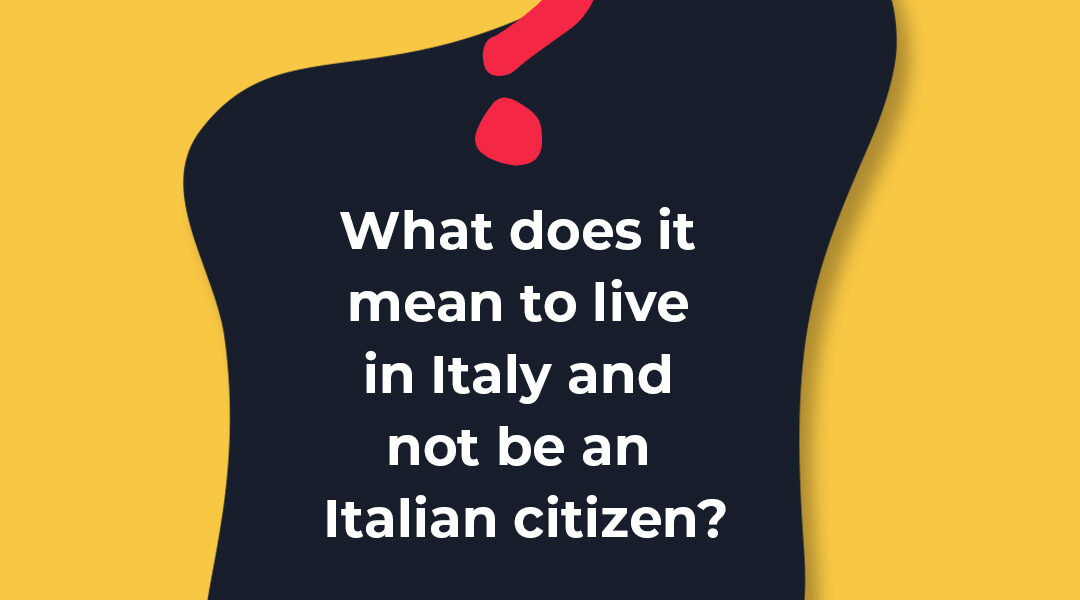
What does it mean to live in Italy and not be an Italian citizen?
The topic of citizenship is both delicate and personal, as well as public, since it is linked to an individual’s identity and their civil, political, social and economic rights. Those who are citizens of a country from birth often take for granted the rights that this status confers, and do not consider what it might mean not to have them. In Italy, however, more than 1 million people defined of second generation experience a mismatch between the two levels, making the issue much more practical than ideological. Like Fatima, who has lived in Italy since the age of two and she is still not an Italian citizen despite her social commitment to the community for which she became Knight of the Order of Merit of the Italian Republic. Like many others born or raised in Italy, her story is characterised by obstacles, delays and expenses associated with renewing the residence permit — without which one cannot move, and which often leaves one living in uncertainty about losing it. Furthermore, if parents would unfortunately lose their jobs and, consequently, their residence permits, their children would also become irregular.
This is possible because in Italy, in order to be or become a citizen, one must either be born of Italian parents, or be descendant of Italian citizens, as in the cases of Adriana and Giovanna, although this, paradoxically, has not prevented both of them from a tortuous identity path once here. Or, if you come from outside Europe, you can become Italian if you meet the residential criterion of at least ten years of continuous residence in the territory. On the other hand, for children and kids of the latter, they can apply for citizenship when they turn 18. Is that enough? No, they also need to have a certain level of income,a person without a stable job would not be able to apply even if they have been living in the country for many years and are well integrated into the territory. They must also prove not to have a criminal record in both the country of origin and Italy, even if they arrived here at a very young age. They must have resided in the territory continuously and prove to know the Italian language and culture. This may seem absurd given that these have lived in the social fabric of the country and attended its schools. However, their schooling differs from their peers in the awareness that they do not have the same opportunities in participating in school trips abroad, accessing international exchange projects or receiving scholarships. At 18, they do not have the right to express their opinion by voting and during their university career they cannot participate in exchange projects such as Erasmus. Moreover, the inability to participate in public calls for applications often conditions their choice of study path from the outset.
What second-generation people experience are unjust situations and unequal access to opportunities. Stories and obstacles that, however, often go unheard. The topic is little dealt with and is often misleadingly and instrumentally associated with immigration when speaking of Italian people in all, but law. This has been called legalised discrimination and is also demonstrated by the data collected by Amnesty International’s Hate Barometer, according to which discrimination and hatred with these debates, increase.
Is obtaining citizenship a right or a prize? Is it a matter of luck? Does one have to deserve it?
In Italy, the debate on the issue is anything but recent and several proposals have been made over the years to amend an anachronistic law that does not reflect Italy’s demographic and social reality and creates situations of uncertainty. Obtaining citizenship for those who have lived, studied or worked in Italy forever, or almost, is also a question of identity, dignity and belonging to a place that they call home.
In addition, the concept of Italian-ness should be questioned, not to the detriment of those who have been Italian for generations, but to the benefit of those who feel they are and for the State they are not. These people are also often asked to be just Italian when, in addition to that, one also belongs to the culture of origin whereby one also speaks another language and knows its traditions. One thing does not exclude the other and this would only reflect reality and emphasise the beauty of the diverse and heterogeneous world in which – in any case – we live. Diversity is a value, not only culturally, but also socially, economically and politically. In the words of Fred Kuwornu in his 2011 documentary “18 Ius Soli”:
“The so-called second-generation kids are about 1 million in Italy and they are a great cultural, artistic, scientific, and human capital resource for the country system in Italy”.
Change is needed to make the country fairer and more equitable really for all and each can play their part.
To learn more, we recommend reading articles and listening podcasts that deal with the subject in a critical and detailed manner:


